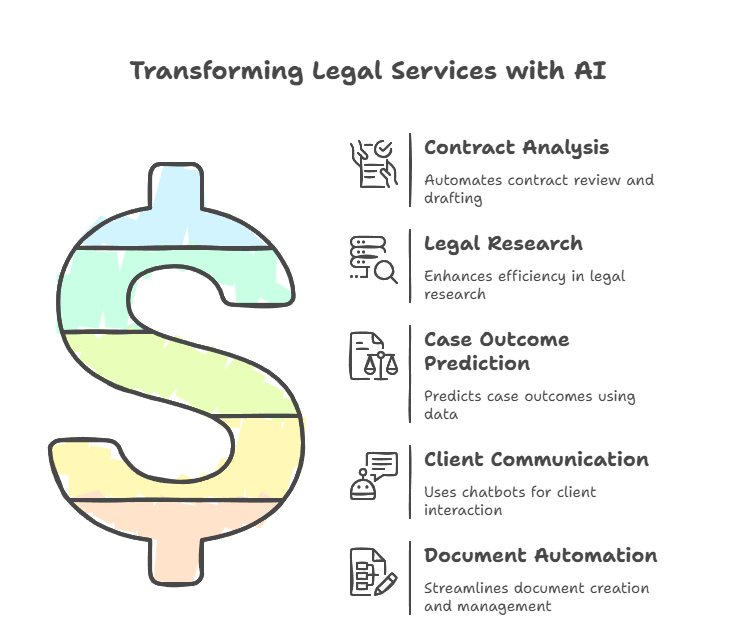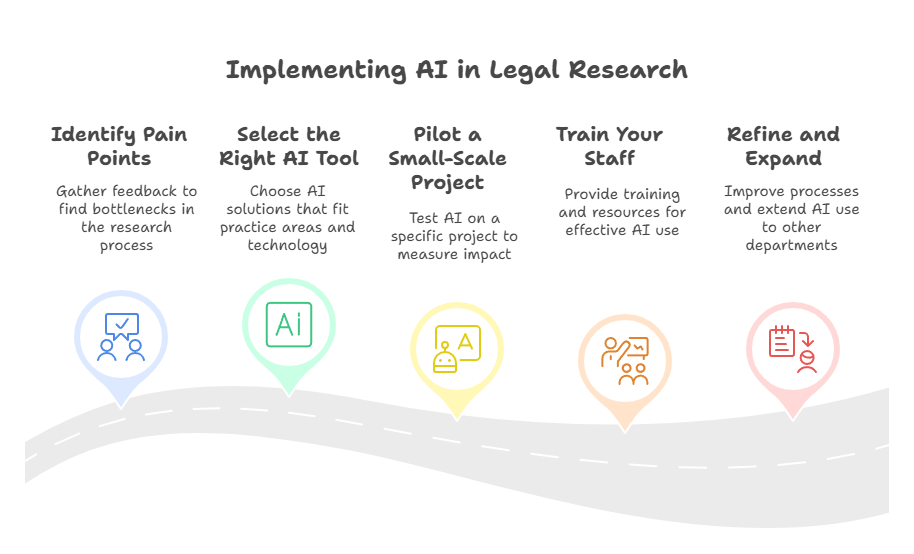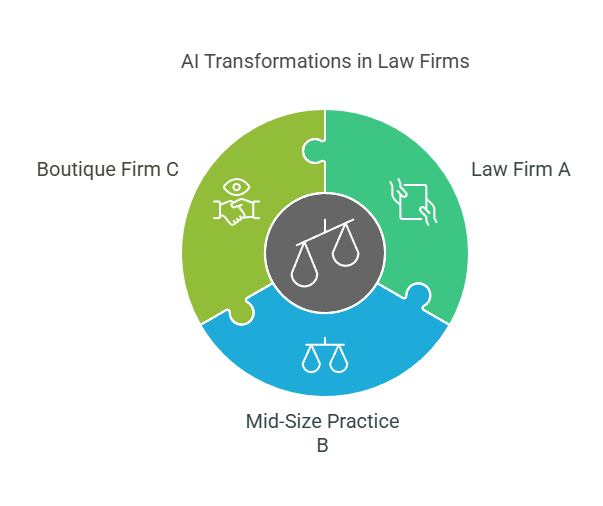A recent report from MarketsandMarkets predicts that global spending on legal tech solutions will exceed 25 billion dollars before the end of this decade. That figure is astounding, yet not entirely surprising, given how swiftly AI in legal services is reshaping the entire industry. As more law firms adopt artificial intelligence in legal research, contract analysis, and case outcome predictions, the legal profession is caught up in a wave of unprecedented transformation. Are you wondering how such a traditionally paperbound sector like law can embrace technology this quickly? Let’s look under the hood.
What is AI in Legal Services?
AI in legal services refers to the use of advanced machine learning in law, natural language processing, and data analytics to streamline and enhance traditional legal processes. That might sound a tad abstract, but think of it this way: whenever you use a software tool to quickly analyze thousands of pages of contracts, or rely on an algorithm to predict potential litigation outcomes, you’re witnessing AI.
Many law firms already employ AI legal software for tasks like e-discovery (where technology combs through massive sets of documents), chatbots (which answer client queries or provide basic legal guidance), and automated time tracking. Over time, the technology has grown more accurate and sophisticated. It’s not just reading your documents, it’s interpreting them, identifying potential ambiguities, spotting clauses that need adjusting, and sometimes even suggesting solutions. The best part? All of this can free up attorneys to focus on complex, higher-value work.
For the modern practice, AI in legal services is becoming a key differentiator. A well-integrated system for AI contract analysis, for instance, reduces risk and shortens contract review cycles, letting attorneys deliver sharper advice under tighter deadlines. Clients notice this improved responsiveness, and that can translate into higher client satisfaction. Some might say that’s a win-win.
Key Applications of Artificial Intelligence in Law Firms
1. Contract Analysis and Drafting
One of the most prominent examples of AI in legal services is automated contract review. Traditional contract parsing is laborious, prone to human oversight, and can slow down major deals. AI-powered legal automation tools accelerate this significantly. By running complex algorithms on textual data, they highlight missing clauses, identify inconsistent language, and even propose alternative wording. It’s like having an extra pair of tireless eyes scanning every detail, day and night.
In practice, AI contract analysis often integrates seamlessly with existing document management systems, providing attorneys with real-time alerts about potential red flags. This benefit applies to both transactional firms and litigation-heavy practices, reducing the risk of unintentional mistakes buried in reams of paperwork. Is it perfect? Not always. Humans remain necessary for final judgment and context-driven decisions. But the improvement to workflow speed is undeniable.
2. Legal Research and E-Discovery
Gone are the days of hauling a cart of casebooks to the reading room. Thanks to AI in legal research, attorneys can search through legal databases using plain language queries. AI legal software, fueled by sophisticated machine learning in law, can grasp the context of your question and return the most relevant cases or statutes at lightning speed.
Legal research platforms also offer predictive search suggestions. If you’re uncertain which specific keywords might uncover that obscure precedent, the platform helps refine your search automatically. It may even suggest related terms you hadn’t considered. This level of detail extends into e-discovery, where enormous data sets are a reality. AI-driven document review tools classify documents by relevance or privilege status, effectively cutting down on the time to find pivotal evidence. That’s a major shift from the old days, when entire junior associate teams might labor endlessly through boxes of printed material.
3. Case Outcome Prediction
It might sound futuristic, yet artificial intelligence in law firms is increasingly being used to forecast how certain judges or courts might rule on specific matters. By analyzing historical case data, these systems can often predict case outcomes with surprising accuracy. While no algorithm can fully replace legal judgment, the added statistical insights help attorneys refine their strategies and realistically advise clients about potential risks.
Imagine having a system that combs through thousands of rulings issued by a particular judge, then notes correlations between specific claim types and awarding patterns. If that system identifies a strong likelihood that your motion will be granted based on prior rulings, you can approach negotiations or settlement talks with greater confidence. For law firm automation with AI, this predictive capability is emerging as a vital differentiator in competitive markets.
4. Chatbots and Client Communication
Law firms are beginning to embrace AI-powered chatbots to handle routine client queries, schedule appointments, or even provide preliminary intake forms. While these chatbots won’t replace direct attorney-client interaction, they alleviate administrative burdens. Clients can quickly get straightforward answers, enabling attorneys to tackle more nuanced legal matters. This approach shows how legal tech AI can facilitate better service without overextending the firm’s staff.
5. Document Automation and Firm Administration
Document automation swiftly merges client details into standard forms, generating final documents that merely need minimal review and signatures. From non-disclosure agreements to lease reviews, the potential for efficiency is huge. Indeed, entire practice groups can reallocate junior lawyers from repetitive drafting tasks to more gratifying assignments that demand creativity and strategic insight. Law firm automation with AI doesn’t stop there though. Billing, conflict checks, and even marketing can all benefit from these robust solutions.

Side-by-Side Comparison of Traditional vs. AI-Powered Legal Tasks
Below is a quick illustration of how AI tech compares to the traditional approach:
| Task | Traditional Method | AI-Powered Approach |
|---|---|---|
| Contract Review | Manual reading, high chance of overlooked issues | Automated clause detection, flagged anomalies in real time |
| Legal Research | Extensive manual searching of case law, risk of missing key precedents | Context-based search with predictive suggestions |
| Case Outcome Prediction | Relies on attorney’s intuition and experience | Historical data analysis with probability-based outcome calculations |
| Document Automation | Handcrafted drafting and revisions | Auto-population of templates, fewer errors, reduced turnaround time |
| Client Interaction | Telephone lines and in-person meetings for simple queries | Chatbots and instant messaging apps for rapid replies |
This table might not capture every nuance, but it shows how AI in legal services can refine many tasks that once demanded large amounts of time and energy.
Step-by-Step Guide: How to Integrate AI in Legal Research
Successfully implementing AI for lawyers requires some planning. Although every firm is different, the following steps provide a starting framework if you’re exploring AI adoption for more efficient legal research.

- Identify Pain Points
Start by collecting feedback from partners, associates, and support staff about the biggest bottlenecks in your current research process. Perhaps your team spends hours each week combing through case law or struggles to retrieve crucial documents from various databases. - Select the Right AI Tool
Look for legal tech AI solutions that align with your current practice areas and technology stack. Some platforms heavily emphasize advanced natural language processing, while others focus on narrower tasks like document classification. Evaluate free trials where possible, and compare each tool’s functionality against your specific use cases. - Pilot a Small-Scale Project
Don’t try to automate everything at once. Test the solution on a defined project—maybe a single practice group or just one type of research assignment. Measure how it impacts speed, cost, and the quality of the research outcomes. - Train Your Staff
Even a top-notch AI legal software platform won’t prove valuable if your team is unclear how to harness it. Conduct hands-on training sessions, create reference materials, and encourage open dialogue about best practices. Get folks comfortable with the new tool before scaling. - Refine and Expand
After gathering initial results, refine the process, incorporate lessons you’ve learned, and then expand the implementation to other departments. A gradual, well-planned rollout often fosters higher staff buy-in and fewer bumps in the road.
If you’re still not certain where to begin, just reach out and let Buildfuture experts share their perspective on the best strategies for your firm. There’s no need to dive in alone when specialized guidance is easily available.
Case Studies: Real-World Adoption of AI-Powered Legal Automation

Law Firm A: Faster Contract Negotiations
Law Firm A, headquartered in a major financial hub, frequently handles large corporate mergers. The volume of documents can be staggering, pushing their attorneys to the brink. By introducing AI contract analysis tools, the firm decreased the contract review window from three weeks to five days. The result? A 35 percent reduction in overall turnaround time, along with fewer costly oversights. Partners noticed that clients were quicker to finalize deals, which boosted morale and improved the firm’s reputation in the finance sector.
Mid-Size Practice B: Predictive Analytics for Litigation
Mid-Size Practice B specialized in insurance litigation, frequently negotiating settlements with big insurance carriers. Historically, the attorneys leaned heavily on their instincts for deciding whether to pursue a trial or settle. However, the firm integrated AI in legal research and case outcome prediction to glean new insights. By analyzing past rulings from local courts, the system identified patterns in jury verdicts that attorneys had not previously spotted. The firm then used these insights to negotiate more favorable settlements. Word traveled quickly among prospective clients—particularly those seeking representation in complex injury claims—and the practice witnessed a surge in client inquiries.
Boutique Firm C: Chatbot for Client Onboarding
Boutique Firm C implemented a simple chatbot on its website to field questions and schedule consultations. Potential clients no longer had to leave voicemails or wait on hold. In the first month alone, the firm attracted twice the number of new client leads. The attorneys didn’t reduce headcount, but they freed up their receptionist to focus on existing client relationships. The firm soon realized that legal tech AI isn’t only about heavy-duty litigation or contract analysis, but also about refining day-to-day processes that matter to client satisfaction.
You can replicate successes like these. If you’d like deeper insight into how AI can streamline your law firm’s internal processes, consider connecting with Buildfuture’s experienced consultants. We’d be delighted to navigate these possibilities alongside you.
Ethical Considerations and Challenges in AI Adoption
Despite its immense potential, artificial intelligence in legal services isn’t free from obstacles. Data privacy stands at the center of most concerns. Lawyers handle sensitive client information, and any breach—even accidental—can create significant liabilities. AI developers must build robust security protocols into their products, and law firms must remain vigilant with their own cybersecurity measures. That’s a big deal if you’re working with cloud-based AI services that store contract data or client records.
Another issue is algorithmic bias. Machine learning in law depends on historical data, which can be skewed by systemic inequalities or incomplete data sets. If the predictive models inadvertently learn biased patterns, they might produce outcomes that disadvantage specific groups of litigants. Law firms, regulators, and software vendors are actively grappling with how to recognize and mitigate such biases.
Attorneys also worry about losing the “human touch.” Traditional client engagement thrives on personal relationships and nuanced understanding. If every minor task is delegated to AI, does that reduce the empathy factor? Probably not if done thoughtfully. A balanced approach keeps the personal elements intact while freeing lawyers from work that doesn’t require nuanced human insight.
On top of that, there’s the question of cost. Although AI legal software can lower long-term operational expenses, initial investments and subscription fees aren’t always cheap. The learning curve can create delays, too. Without a structured adoption strategy, some firms may endure productivity dips before they start to see benefits. So it’s prudent to weigh both short-term burdens and long-term gains. If you’re unsure, get an expert to help you crunch the numbers.
The Future of AI in Legal Services
AI is living up to its hype, but it’s also evolving fast. Looking ahead, advanced AI tools promise deeper insights using neural networks and predictive modeling. These developments might enable more robust risk assessments, letting firms gauge each contract or dispute’s likelihood of success with uncanny precision. Some forward-thinking practitioners even predict a future of “virtual attorneys” that handle simple compliance matters autonomously.
Text generation is also on the cusp of a breakthrough. Tools that draft motions, briefs, and even professional emails are improving daily. Some major law offices are piloting them as time-savers for routine communications. And that’s only the beginning. Are we heading toward an era where your digital “colleague” manages entire deals from start to finish? Perhaps that’s still years away, but the building blocks are already taking shape.
If you’re looking to keep pace with these developments, it can be smart to test out approaches that align with your firm’s strategic goals. Consider forging a partnership with a tech-savvy consultant, or start building your own AI-literate team. By doing so, you’ll be ready to maximize the value of the next wave of AI breakthroughs.
Gazing at tomorrow can spark your imagination. Plan for it now so you aren’t left behind when AI leaps forward, as it inevitably will.
Bringing It All Together
AI in legal services is no longer a futuristic concept. It’s quickly becoming a foundational pillar for how modern law firms operate. From AI contract analysis to predictive research and chatbots, artificial intelligence in law firms is changing the game, unlocking efficiency and precision. Yes, challenges exist—bias in data, privacy concerns, and the initial costs of adoption. But these obstacles are addressable with careful planning, ethical oversight, and a mindset committed to continuous learning.
Now might be your chance to explore new partnership opportunities that combine legal tech AI with your firm’s core strengths. By working with an experienced team, you can pilot custom solutions for tasks like contract reviews or litigation forecasting. Imagine the competitive edge you’ll have once your attorneys can devote more time to nuanced legal strategy and nuanced conversations with clients.
We’d love to hear about your firm’s unique challenges and identify the best AI approach for your practice. If you’re curious about how to start, or you want to build your own automated system for compliance, scheduling a quick conversation could be the first step toward transforming your entire operation.
Feel free to reach out if you want to discuss integrating AI in legal research or even full-scale law firm automation with AI. At Buildfuture, we stay on top of AI developments to ensure our partners thrive in this rapidly changing climate. Join us in shaping the future of legal tech by co-creating solutions that push the boundaries of AI. You’ll be in good company, pushing your practice to the next level.
Buildfuture is a leader in delivering intelligent tech solutions that empower businesses to pave the way for innovation. Our dedicated experts tailor each AI recommendation to the unique needs of clients—whether you manage a global firm or a boutique practice. Let’s partner, explore new capabilities, and chart a path that puts your firm at the forefront of legal tech AI. We’re ready to help whenever you’re ready to begin.




